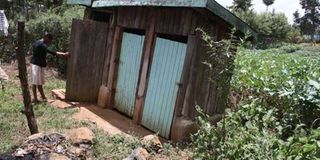Over 300 villages in Nakuru now meet sanitation standards

A pit latrine. FILE PHOTO | NATION MEDIA GROUP
What you need to know:
- Open defecation results to higher prevalence of diseases like amoebiasis, typhoid and cholera.
- In its vision 2020 initiative, the Nakuru County government hopes to declare the region free from open defecation.
- The next phase of the project is expected to run from 2017 to 2020 and will cost Sh18 million.
- A World Bank report on sanitation indicates that a child dies of diarrhoea in Kenya every 15 minutes.
More than 300 villages in Nakuru County have been declared open defecation free (ODF), with 200 of them having been issued with certificates.
The villages are situated in Rongai, Naivasha, Gilgil and Bahati.
According to County Health Executive, Dr Kabii Mungai, Nakuru loses about Sh1 billion as a result of expenses in treating ailments associated with poor sanitation.
“Poor sanitation of costs the country Sh27 billion annually and Nakuru County accounts for more than Sh1 billion of the amount,” said Dr Mungai.
Dr Mungai said defecating in the open results to higher prevalence of diseases like amoebiasis, typhoid and cholera.
In its vision 2020 initiative, the Nakuru County government hopes to declare the region free from open defecation.
Besides being issued with certificates, the compliant villages are also given a sign post to indicate that they are free from open defecation.
According to the county’s Public Health Officer Samuel King’ori, the next phase of the project is expected to run from 2017 to 2020 and will cost Sh18 million.
“Sanitation is a costly affair but in the long run would translate into massive savings on personal and government resources,” he said.
According to Mr King’ori, challenges facing the county’s sanitation project include inadequate funding and shortage of staff.
However, he said communities are very supportive and willing to embrace the programme.
A report by the World Bank on water and sanitation indicates that a child dies of diarrhoea in Kenya every 15 minutes.




